Story and photos by Mario Joseph
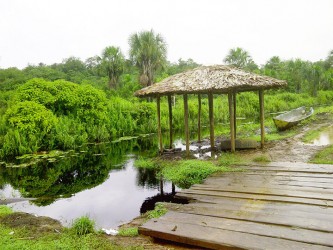
Deep in the North West District, Region One, in a world far beyond Georgetown, there lies a lush, green, remote village called Tobago Hill. It’s a fairly new community filled with beauty and potential in terms of its natural aura, foliage and waterway, as well as its people and farming capacity. The village is populated by Amerindians mostly from the Warrau nation, who were relocated because their original settlement was threatened by erosion.
The community has a population of 191 persons, down from approximately 300 when it was founded, and has a school and a church within a stone’s throw of the residential area. There are about 37 homes, situated close to each other, equipped with small solar panels with batteries that power a few light bulbs. The community was established some nine years ago after being relocated from the Somottoo Creek at the mouth of the Aruka River which was subject to erosion. The school is an annex of the Wauna Primary School, and is staffed by three teachers from Mabaruma.
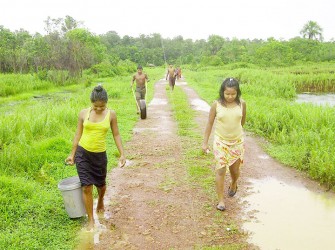
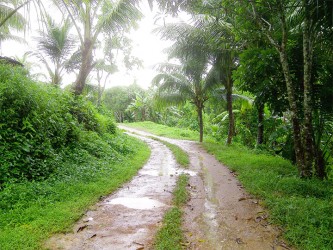
Owing to its remoteness, few dwelled in Tobago Hill prior to 2000, and the influx of residents thereafter was accommodated in homes constructed by the authorities in collaboration with a non-governmental organisation. Efforts have been made by other non-governmental agencies along with the government towards developing the community whose main livelihood is farming, although there are a few labourers and community service officers.
The community is led by Toshao Patrick Thomas, who has held the position for the past two years. The Toshao is the elected village leader who governs with a team of councillors who are each community service officers, receiving a government stipend of $30,000.
The village became associated with tuberculosis back in 2010, although according to the the Toshao, the fears at the time were unfounded, and were fanned by media sensationalism. He explained that there were only four persons who contracted the disease, one of whom died some time later but that there was no endemic. However, the stigma, he said, has plagued the village ever since, and causes visitors to be reluctant to enter, whilst outsiders gossip and spread disinformation.
This was confirmed after Sunday Stabroek spoke to some residents in Mabaruma, with a health worker even warning that a face mask should be worn when visiting the village.
The village is also known for the four hassar fish ponds which were part of an $88 million National Secure Livelihood Programme launched by the government in 2009 to assist Region One communities. The project, plagued by many challenges from its inception, has now become a white elephant.
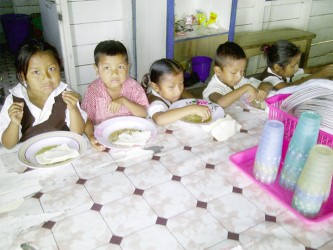
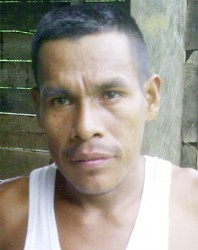
Toshao Patrick Thomas, 42, described his people’s way of life. “We are from the Warrau tribe; the language we still understand and sometimes speak, even though we learnt English,” he said; “the children who have been privileged to attend school understand both languages as well.” He went on to say, “We used to live indigenously, but not like the original Amerindians; we wore modern clothes and even used a spear gun to catch fish.”
Regarding the living conditions, he said, “We get water for about two hours from a GWI pump on Tuesday, Thursday, Saturday and Sunday.” He added, “Since we moved here, close to 9 years ago, we grew accustomed to it and we enjoy living here… It was a significant improvement from before; we have three boats with 15 hp engines, which we use to catch crab and fish when the weather permits us to do so.”
With respect to economic activity, he said, “We make cassava bread which we sell in Kumaka, and we have seven Community Service Officers (CSO) but this is not enough employment for our community.” He went on to explain that the CSOs are part-time employees of the state, tasked with providing all kinds of assistance to the community whether in schools and health centres, or cleaning and looking after the fish pond.
“We believe that the government is trying their best to develop our community and we are grateful, but we still need much more. Just look at our roads; they’re not very nice. We have to wait very long to get transportation in and out.” On market days, there is a greater frequency of vehicles passing, and the residents said that the least the government could do would be to fix the road which they describe as becoming like a swamp like during periods of heavy rainfall.
Councillor Vincent Pedro, 44, said he has been farming since he was 12 and refers to life in Tobago Hill as sometimes life easy and sometimes hard. He added, “Very few adults can read and write, even after the Adult Literacy Programme”, which was a joint venture between the Canada Fund for Local Initiatives (CFLI), formerly a CIDA-sponsored fund, the Government of New Zealand, the United States Peace Corps, the Region One Regional Democratic Council, the Department of Education and the Tobago Hill Village Council.
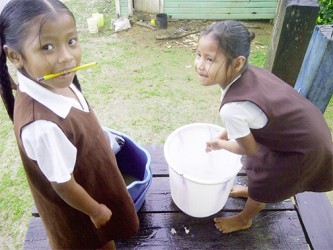
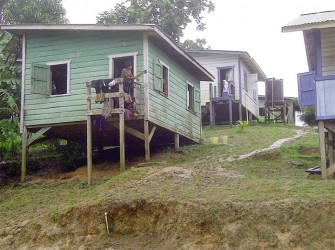
Speaking of employment in the community, he said, “My livelihood mostly comes from farming, but is severely affected by the rain.” He went on to say, “I farm cassava, bora, pumpkin, squash, among others.” He added, “The farms are located deep in the backdams where snakes lurk… Several persons have been bitten by snakes in the past and gotten into accidents because of the undeveloped terrain.”
“Amazon Caribbean (Guyana) Ltd (Amcar) is another source of employment,” he said, “paying persons to harvest cabbage for their packaging plant. Some people come in and look for labourers; sometimes we hunt wild meat with our dogs but we don’t do animal farming.” However, he went on, “There aren’t much jobs available for the persons here; the few employers try to take advantage of us because they know we need the work. I have been mistreated and even unpaid by at least three different employers, but there’s nothing that I can do about that. I even sustained an injury which put me out of work for several weeks with no form of compensation.”
Ruminating on life in the village, Pedro said, “There are no recreational activities available; we have about 12 televisions in the entire village with DVD players and because we don’t get any radio signals, we watch movies on the disks.”
He did comment, however, that “Neighbours live friendly with each other but we do have a dispute every now and then. Our houses used to be far from each other but now that we’re so close I think that may be the reason we have arguments” adding that residents can actually see into each other’s houses from the windows. On the positive side he said, ‘There is no crime in our community, domestic violence or child abuse and that make me proud.”
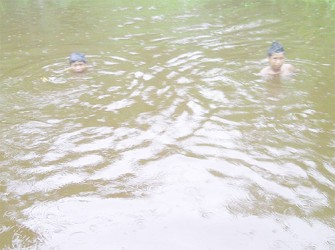
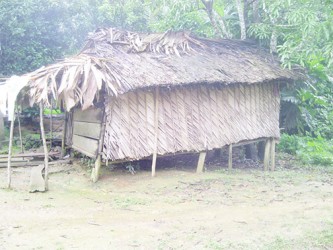
In terms of family life he said that raising a family is hard: “I have nine children and the $30,000 stipend cannot suffice. I have to hustle hard to feed them and equip them for school; sometimes the ones who attend secondary school have to stay home because I can’t afford to send them, especially because of those roads which make transportation expensive. I know that it is bad to do that, but what can I do? He further lamented, “Sometimes we have to skip meals when we have nothing in the kitchen; sometimes we would go look for crabs or pick cabbage, but sometimes we turn up with little or none. Families depend on each other for a brace during times like this.”
The teacher in charge of the Tobago primary School, Sallina Leung, said that the school started in 2010 and that she has been there for over a year. The school offers primary education to some 28 children who would not have had any formal schooling in a nursery school. She said that the school faces a difficulty in dealing with children coming in speaking a different language and having an odd accent. Another challenge she faces is the laborious journey to and from the school which she said is hard on a teacher’s salary, since it amounts to $800 daily.
Offering her opinion on the state of the Tobago Hill community, she said, “I don’t think the children live under good conditions, but the adults there should try to uplift themselves rather than waiting for something to happen.” She was of the view that, “The government is paying much attention to the community and is providing much aid but the government can’t do everything.” She went on to say that she cares for children and has a passion for teaching so she puts up with the daily hardship.
Anita Thomas and Lewis Jeffrey, the couple who operate the hot meal project kitchen told of their experience of life in Tobago Hill. Jeffrey, 62, is the person in charge of the kitchen which started about two years ago, while his wife, Thomas, 68, helps with the cooking. The initiative provides some 38 children with lunch every day in the form of meals such as cook-up rice, chicken curry, cassava bread, fried fish and bakes, among other dishes. On the day Stabroek News visited they children were having stewed fish and cassava bread.
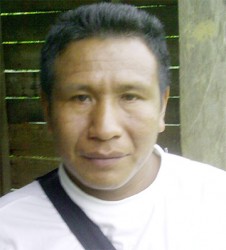
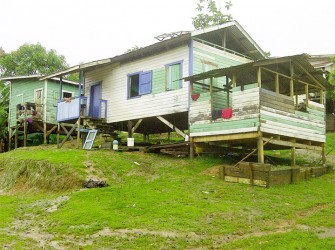
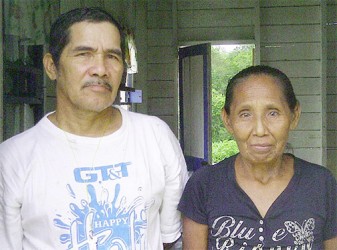
Describing life in Tobago Hill, Jeffrey said that life is good but financing is difficult. He added that only some people find work while the others have nothing to do. He receives a sum of $6,000 per week from the government while Thomas receives $5,000, which they both described as insufficient. Thomas said that life is sometimes hard, with the lack of jobs being key to this hardship. She explained that a lot of persons are crying out about the rate of pay they receive for whatever work they do, but because they have no choice, have to accept what they get.
While labelling the strength of the community as its quiet and peacefulness, they thought certain things should be done to improve the settlement, with the road as being most important. The government should fix it, they said, as it would stimulate more travel, easier transport of produce and more activity in general. They also wanted better lavatory facilities built for them and a disposal mechanism for waste. After that, they expressed the view, “Maybe they could see how we could get better electricity and water supplies, which we know is hard.”
Speaking as a mother, with eight children, Thomas said that it is difficult to provide children with school items and normal clothes since everything is so expensive. She said, “If we can’t afford, they have to do without… [and] sometimes, we can’t even afford to feed them and they have to skip meals.” She went on to say that the children lack a playground and much needed recreation, and although they have a small window available for them to become better persons with the school nearby, they would still need jobs which are currently lacking, when they complete school. She then pointed out that the adults have no form of recreation either except for the church, which she said she enjoys very much.





